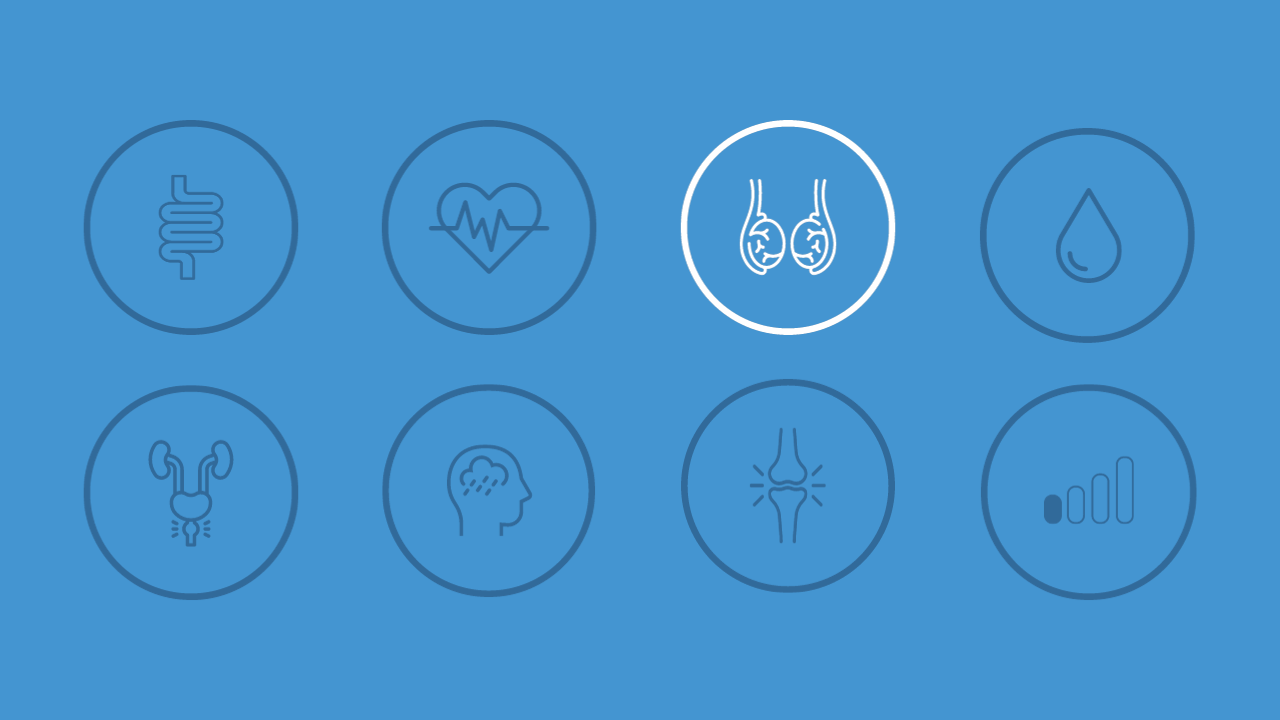Colorectal Cancer in Men
Your questions answered on colorectal cancer in men. Including information about screening, risk factors and prevention through lifestyle choices.
Medically reviewed by:

MD, MS, FRCPC
Colorectal cancer is the second leading cause of death from cancer in men
What is colorectal cancer ?
Colorectal cancer (also known as colon cancer) almost always occurs from polyps or growth in the lining of the large intestine. The colon, also known as the large intestine, makes up the last part of the digestive tract.
Detected early, colorectal cancer is highly treatable. Many experience minor or no symptoms in the early stages, which is why regular screening is recommended at age 50 or earlier depending on your risk factors.
Signs & Symptoms
At its earliest stages, colorectal cancer may not cause any signs or symptoms, or symptoms may be minor. Symptoms can also mimic other, less serious gastrointestinal conditions, which should always be addressed with a healthcare practitioner.
Early warning signs of colorectal cancer include:
- Change in your bowel routine (frequency and urgency)
- Change in shape or look of stool
- The urge to have a bowel movement but nothing passes
- Rectal bleeding
- Blood in or on the stool, ranging from bright red to dark black
- Abdominal pain/discomfort including bloating, fullness, cramps, gas pain
- Unexplained weight loss
- Weakness and fatigue
- Anemia, caused by iron deficiency
Risk Factors
Colorectal cancer is more common in men than women. Most people are diagnosed over the age of 50, however rates of colorectal cancer are rising sharply among young and middle-aged individuals. One of the primary risk factors is having a first-degree relative who was diagnosed with colorectal cancer.
Some of the common risk factors for developing colorectal cancer include:
- Family history
- Polyps in the colon and rectum
- Lack of physical activity
- Obesity or being overweight
- Alcohol
- Smoking
- Diet high in red and/or processed meat
- Cooking meat at high temperatures (well done, fried, boiled, BBQ)
- Diet low in fibre
- Sedentary behaviour
- Inflammatory bowel disease
- Diabetes
- Ashkenazi Jewish ancestry
- Exposure to ionizing radiation
There are also some inherited and rare genetic conditions such as Lynch Syndrome and familial adenomatous polyposis (FAP) that can increase your risk. If you have had colorectal cancer, you also have a higher risk of developing a second colorectal cancer.
Are You At Risk?
Learn your risk level for the most common men’s health conditions in 10 minutes with a free, confidential, and personalized report.
Screening
90% of colorectal cancer cases are treatable when caught early.
Canadian Cancer Society
Early screening for colorectal cancer may be done with a stool test and/or colonoscopy:
- If you are 50 to 74 years old and are not at high risk for colorectal cancer, a stool test is recommended every 2 years. If a stool test shows traces of blood, you may also need a colonoscopy.
- Higher-risk individuals (i.e., those with a family history, who have ulcerative colitis, or have a history of polyps) will need a colonoscopy. If you have a direct family member who had colorectal cancer at 50 years of age or younger, screening may begin 10 years earlier than the family member who was diagnosed.
In a colonoscopy, a tube with a light and camera on the end is used to check for polyps, abnormalities, and to take tissue samples from the colon or rectum. During a colonoscopy, they can identify and remove polyps before they turn into cancer.
Download the Men’s Health Checklist for a full list of what tests you need, and when to screen for common men’s health conditions.
Diagnosis
If screening test(s) reveal abnormal results, or if you are experiencing symptoms, additional testing is required to diagnose colorectal cancer.
Tests may include a digital rectum exam, CT colonography, flexible sigmoidoscopy, blood tests, and/or other scans.
Prevention
Learn Your Family History
Colon cancer can run in families. Learn whether a close family member has had colon cancer, colon polyps or any cancer before age 45.
Get Active
Being physically active lowers the risk of colorectal cancer. It is recommended to aim for at least 30 minutes of moderate physical activity every day, such as walking, yard work, or riding your bike. Exercise can help reduce inflammation and improve immune system function. It also reduces the time it takes for food to travel through the digestive system, which decreases gastrointestinal tract exposure to possible carcinogens.
Eat Healthier
Eating a healthy diet can help lower your risk of colorectal cancer. Colourful veggies have natural substances (phytochemicals) that may block the growth of cancer cells or fight the inflammation that can fuel cancer. Eating more whole grains and fibre helps add bulk to your stool which better absorbs toxins and moves food through your system faster.
Improving diet and exercise can also help you maintain a healthy body weight. A BMI above 25 increases the risk of developing colorectal cancer.
Quit Smoking
Smoking long-term can increase the risk of colorectal cancer, and many other cancers. Quitting may help to reduce your risk.
Drink Less
Drinking two or more alcoholic drinks every day increases the risk of colorectal cancer. Start by counting how many drinks you have weekly and set targets to drink less.
Get Easy Tips To Reduce Your Risk
Treatment
Treatment is dependent on the type, location and stage of your colorectal cancer, in addition to other conditions.
If identified early, and it hasn’t spread, colorectal cancer lesions can be removed in surgery. Further treatment may be recommended through chemotherapy, targeted therapy and/or radiation.
Frequently Asked Questions
A Guy’s Guide to Eating Healthy
Make healthy eating easier with simple dietitian tips, food facts and recipes made for men.

proudly sponsored by:

Medically reviewed by:

Dr. Brian Bressler, MD, MS, FRCPC
Dr. Bressler is a gastroenterologist and director of the Advanced IBD training at the University of British Columbia. He is also the founder of The IBD Centre of BC
More about Dr. Brian Bressler


